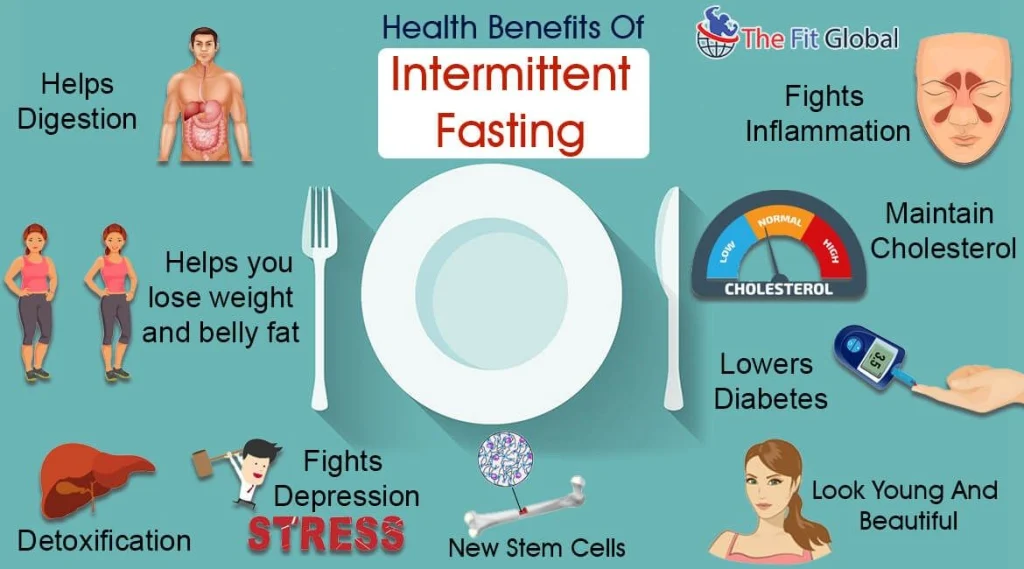Intermittent fasting (IF) has gained immense popularity as a powerful approach to improving health, managing weight, and enhancing overall well-being. Unlike traditional diets that focus on what to eat, intermittent fasting emphasizes when to eat. This method involves alternating periods of eating and fasting, allowing the body to reset and function optimally. But is it the right approach for you? Let’s explore the health benefits of intermittent fasting and determine if it aligns with your lifestyle.
What is Intermittent Fasting?
Intermittent fasting is not a diet but an eating pattern. It involves cycles of eating and fasting, giving the body time to rest and repair itself. There are several popular methods of intermittent fasting, including:
16/8 Method – Fasting for 16 hours and eating within an 8-hour window.
5:2 Diet – Eating normally for five days and reducing calorie intake to 500-600 on two non-consecutive days.
Alternate-Day Fasting – Alternating between fasting days and regular eating days.
Eat-Stop-Eat – Fasting for a full 24 hours once or twice a week.
Each method offers unique benefits, but all work by restricting food intake for a period, encouraging the body to burn stored energy.

Health Benefits of Intermittent Fasting
1. Supports Weight Loss and Fat Loss
One of the most well-known benefits of intermittent fasting is its effectiveness in weight management. By reducing the eating window, IF naturally leads to lower calorie consumption. Moreover, fasting helps regulate insulin levels, making it easier for the body to burn stored fat for energy. Studies have shown that intermittent fasting can boost metabolism, enhance fat loss, and help maintain muscle mass.
2. Improves Insulin Sensitivity and Lowers Risk of Type 2 Diabetes
Intermittent fasting significantly impacts insulin sensitivity. During fasting periods, insulin levels drop, allowing fat cells to release stored energy. This process reduces insulin resistance, a major factor in developing type 2 diabetes. Research suggests that intermittent fasting can help lower blood sugar levels and reduce the risk of developing diabetes.
3. Enhances Heart Health
Heart disease remains one of the leading causes of death worldwide. Intermittent fasting has been linked to improved heart health by reducing several risk factors, including:
Lower blood pressure
Reduced LDL (bad) cholesterol levels
Decreased inflammation
Better regulation of blood sugar levels
These factors contribute to a healthier cardiovascular system and lower the risk of heart-related complications.
4. Promotes Cellular Repair and Longevity
During fasting, the body initiates a process called autophagy, where it removes damaged cells and regenerates new ones. This process is crucial for longevity and reducing the risk of age-related diseases such as Alzheimer’s and Parkinson’s. Studies suggest that intermittent fasting may slow down aging and promote a longer, healthier life.
5. Boosts Brain Function and Mental Clarity
Intermittent fasting is beneficial for brain health. It increases the production of brain-derived neurotrophic factor (BDNF), a protein that supports cognitive function and reduces the risk of neurodegenerative diseases. Fasting has also been linked to improved focus, mental clarity, and memory.
6. Reduces Inflammation and Oxidative Stress
Chronic inflammation is a key contributor to many diseases, including cancer, arthritis, and heart disease. Intermittent fasting helps reduce inflammation and oxidative stress by decreasing harmful free radicals in the body. This can lead to overall better health and a lower risk of chronic illnesses.
7. Supports Gut Health and Digestion
Fasting gives the digestive system a break, allowing it to reset and function more efficiently. It can help reduce bloating, improve gut microbiome diversity, and support better digestion. Some studies suggest that intermittent fasting may also help manage conditions like irritable bowel syndrome (IBS).

Is Intermittent Fasting Right for You?
While intermittent fasting offers numerous benefits, it may not be suitable for everyone. Here are some factors to consider before starting:
Who Can Benefit from Intermittent Fasting?
Individuals looking to lose weight or manage their weight effectively.
Those with a sedentary lifestyle who want to improve metabolism.
People with insulin resistance or prediabetes.
Individuals seeking mental clarity and better focus.
Those aiming to improve their heart health and longevity.
Who Should Avoid Intermittent Fasting?
- Pregnant or breastfeeding women, as they require consistent nutrient intake.
- Individuals with a history of eating disorders, as fasting can trigger unhealthy eating patterns.
- Those with certain medical conditions (e.g., diabetes, low blood pressure) should consult a doctor before trying IF.
- People who experience severe hunger or fatigue during fasting periods.
Tips for Successful Intermittent Fasting
Start Slowly – If you’re new to fasting, begin with a shorter fasting window and gradually extend it.
Stay Hydrated – Drink plenty of water, herbal teas, or black coffee during fasting periods.
Eat Nutrient-Dense Foods – Focus on whole foods, lean proteins, healthy fats, and fiber-rich vegetables.
Listen to Your Body – If you feel weak or dizzy, adjust your fasting schedule or consult a healthcare professional.
Stay Consistent – Regular fasting patterns yield better long-term results.
For your Information
- How much exercise really benefits a healthy heart and health? Click here and know some interesting facts about its.
- The impact of environmental noise on heart health? Read more about some facts and its impact on body.
Final Thoughts
Intermittent fasting is a powerful tool that can improve overall health, support weight management, and enhance longevity. However, it’s essential to assess whether this eating pattern fits your lifestyle and individual health needs. If done correctly, intermittent fasting can be a sustainable and effective way to achieve better health and well-being. Before starting, it’s always a good idea to consult a healthcare professional, especially if you have underlying medical conditions.
FAQs
Can I drink water during intermittent fasting?
Yes, you can drink water, herbal teas, black coffee, and other non-caloric beverages during fasting periods.How long does it take to see results from intermittent fasting?
Results vary, but many people notice weight loss and improved energy levels within a few weeks.Does intermittent fasting slow down metabolism?
No, intermittent fasting can actually boost metabolism by enhancing fat burning and improving insulin sensitivity.Can I exercise while fasting?
Yes, light to moderate exercise is generally safe during fasting, but listen to your body and adjust intensity as needed.Is intermittent fasting safe for everyone?
While generally safe, it may not be suitable for pregnant women, people with medical conditions, or those with a history of eating disorders. Always consult a doctor first.